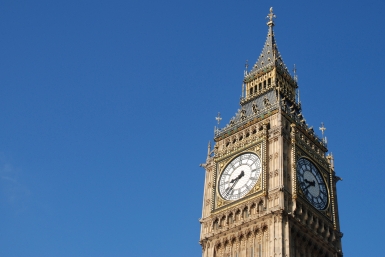Conservatives promise 100Mbps in tech manifesto
The Conservative Party has made some bold promises putting tech at the heart of its election campaign.


The Conservative Party has unveiled the techie side of its election manifesto, promising 100Mbps broadband, a moratorium on big IT projects and open access to government data.
The Conservatives have long included IT elements in their promises, saying they will - if elected - end the ID card scheme and cut down the massive NHS IT project.
While neither of those issues were directly addressed in the Conservative Technology Manifesto, the party did look to take on Labour's Digital Economy Bill, most notably by promising to be the first European country to offer 100Mbps connections to "most" citizens.
While that's much more ambitious than the 2Mbps by 2012 promised by Labour, it's still a vague promise, offering no definition to what "most" means or when exactly roll out would be completed.
There would be no initial government funding for this, with the Tories favoring private sector investment, encouraged by opening up network infrastructure - as in, BT's networks - and "easing rules". If that doesn't provide enough cash, the party will "consider" using funds from the BBC licence fee for loans.
Investment and skills
The Tories also promised to keep R&D tax credits, but focus on high tech companies, small businesses and new start ups, in order to "stimulate a new wave of technology."
Sign up today and you will receive a free copy of our Future Focus 2025 report - the leading guidance on AI, cybersecurity and other IT challenges as per 700+ senior executives
The skills for this new wave will be provided by 12 new tech academies. Top science and tech graduates will be encouraged to consider teaching their subjects by having their student loans repaid and salaries given a boost.
Big projects
The Conservatives promised to open up public sector procurement to SMBs and new start-ups, rather than hand 90 per cent of bids to just nine companies, as Labour has done.
"To ensure that high tech small businesses are not locked out of the IT procurement process, a Conservative government will also introduce a presumption against government IT contracts worth over 100 million," the report reads. "These policies will not only save costs, but will also help to catalyse the growth of the next generation of high tech British IT companies."
This will include an in-house development team to offer unbiased advice, a focus on open standards to allow open source firms to compete, as well as a "presumption against government IT contracts worth over 100 million."
With a nod to big projects like the NHS IT programme, the Conservatives will "impose an immediate moratorium on planned IT procurement projects in order to evaluate upcoming projects and ensure that small businesses and open source IT providers are not locked out of the bidding process."
Open data
If elected, the Tories would follow the lead of Barack Obama in the US by creating a "Right to Government Data" - meaning the public can request any data sets. The manifesto claimed this would also create 6 billion in "additional value" for the UK, by driving the creation of applications and services.
The Conservatives would also force certain information online, including pay rates for top civil servants and details on contracts over 25,000.
On top of this, the document promises a new parliamentary programme called Public Reading Stage. Details were scarce, but it promises to "involve the public in the legislative process and harness the wisdom of crowds to improve legislation and spot potential problems before a bill is implemented."
Freelance journalist Nicole Kobie first started writing for ITPro in 2007, with bylines in New Scientist, Wired, PC Pro and many more.
Nicole the author of a book about the history of technology, The Long History of the Future.
-
 UK’s ‘Tech Prosperity Deal' with US hits rocky ground
UK’s ‘Tech Prosperity Deal' with US hits rocky groundNews The US has reportedly threatened to pull out of the deal over the Digital Services Tax and broader economic disagreements
-
 ‘A major step forward’: Keir Starmer’s £187 million tech skills drive welcomed by UK industry
‘A major step forward’: Keir Starmer’s £187 million tech skills drive welcomed by UK industryNews The ‘TechFirst’ program aims to shore up the UK’s digital skills to meet future AI needs
-
 Government’s ‘Humphrey’ AI tool helps local authorities cut costs
Government’s ‘Humphrey’ AI tool helps local authorities cut costsNews The Minute tool, part of the Humphrey AI assistant, is being trialled at 25 councils
-
 Starmer bets big on AI to unlock public sector savings
Starmer bets big on AI to unlock public sector savingsNews AI adoption could be a major boon for the UK and save taxpayers billions, according to prime minister Keir Starmer.
-
 UK government targets ‘startup’ mindset in AI funding overhaul
UK government targets ‘startup’ mindset in AI funding overhaulNews Public sector AI funding will be overhauled in the UK in a bid to simplify processes and push more projects into development.
-
 UK government signs up Anthropic to improve public services
UK government signs up Anthropic to improve public servicesNews The UK government has signed a memorandum of understanding with Anthropic to explore how the company's Claude AI assistant could be used to improve access to public services.
-
 The UK’s AI ambitions face one major hurdle – finding enough home-grown talent
The UK’s AI ambitions face one major hurdle – finding enough home-grown talentNews Research shows UK enterprises are struggling to fill AI roles, raising concerns over the country's ability to meet expectations in the global AI race.
-
 US government urged to overhaul outdated technology
US government urged to overhaul outdated technologyNews A review from the US Government Accountability Office (GAO) has found legacy technology and outdated IT systems are negatively impacting efficiency.


